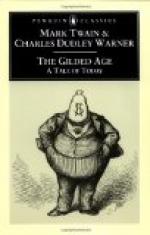It would not be too much to say that upon the first publication of the facts of the tragedy, there was an almost universal feeling of rage against the murderess in the Tombs, and that reports of her beauty only heightened the indignation. It was as if she presumed upon that and upon her sex, to defy the law; and there was a fervent, hope that the law would take its plain course.
Yet Laura was not without friends, and some of them very influential too. She had in keeping a great many secrets and a great many reputations, perhaps. Who shall set himself up to judge human motives. Why, indeed, might we not feel pity for a woman whose brilliant career had been so suddenly extinguished in misfortune and crime? Those who had known her so well in Washington might find it impossible to believe that the fascinating woman could have had murder in her heart, and would readily give ear to the current sentimentality about the temporary aberration of mind under the stress of personal calamity.
Senator Dilworthy, was greatly shocked, of course, but he was full of charity for the erring.
“We shall all need mercy,” he said. “Laura as an inmate of my family was a most exemplary female, amiable, affectionate and truthful, perhaps too fond of gaiety, and neglectful of the externals of religion, but a woman of principle. She may have had experiences of which I am ignorant, but she could not have gone to this extremity if she had been in her own right mind.”
To the Senator’s credit be it said, he was willing to help Laura and her family in this dreadful trial. She, herself, was not without money, for the Washington lobbyist is not seldom more fortunate than the Washington claimant, and she was able to procure a good many luxuries to mitigate the severity of her prison life. It enabled her also to have her own family near her, and to see some of them daily. The tender solicitude of her mother, her childlike grief, and her firm belief in the real guiltlessness of her daughter, touched even the custodians of the Tombs who are enured to scenes of pathos.
Mrs. Hawkins had hastened to her daughter as soon as she received money for the journey. She had no reproaches, she had only tenderness and pity. She could not shut out the dreadful facts of the case, but it had been enough for her that Laura had said, in their first interview, “mother, I did not know what I was doing.” She obtained lodgings near, the prison and devoted her life to her daughter, as if she had been really her own child. She would have remained in the prison day and night if it had been permitted. She was aged and feeble, but this great necessity seemed to give her new life.
The pathetic story of the old lady’s ministrations, and her simplicity and faith, also got into the newspapers in time, and probably added to the pathos of this wrecked woman’s fate, which was beginning to be felt by the public. It was certain that she had champions who thought that her wrongs ought to be placed against her crime, and expressions of this feeling came to her in various ways. Visitors came to see her, and gifts of fruit and flowers were sent, which brought some cheer into her hard and gloomy cell.




